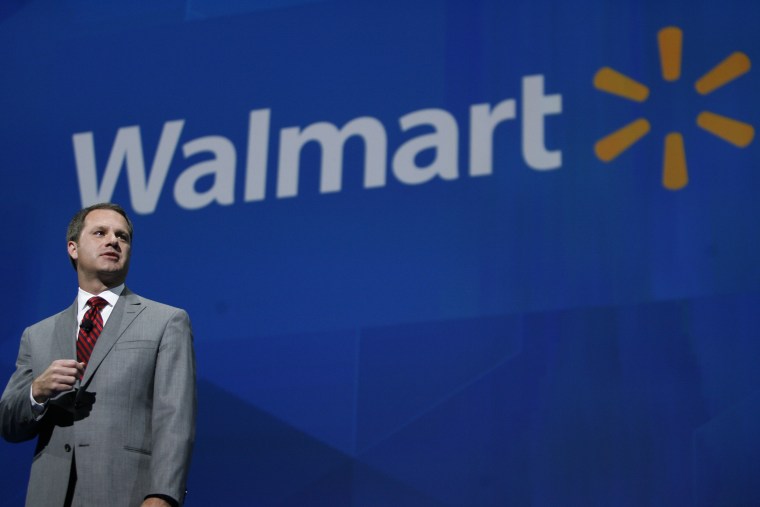The theme of Walmart's annual shareholder meeting last week seemed to be worker-manager harmony: all is at peace in the Walmart kingdom.
While spokespeople, special guests and official materials did not explicitly address the labor unrest currently rippling through the company's supply chain, labor activists and striking workers said the company's focus on employee satisfaction was an indirect response to the recent strikes and protests.
"Walmart spent this meeting responding to their concerns," said Making Change at Walmart spokesperson Derek Plummer, speaking to a small gathering of journalists on Monday. "Even having Tom Cruise respond to their concerns."
Indeed, Tom Cruise made a special appearance at the shareholders' meeting, pitching the audience on Walmart's efforts to "improve women's lives across the world"—perhaps an oblique response to the legal complaints accusing Walmart of widespread sex discrimination.
Two weeks ago, about 100 workers from Walmarts around the country walked off the job and converged on Arkansas in anticipation of the shareholders' meeting. While nowhere close in size to last November's Black Friday work stoppage, this was by far the longest strike to occur in the anti-Walmart campaign. Strikers rallied at Walmart headquarters in Bentonville, Ark. in advance of the meeting, but their protests did not disrupt the shareholders' meeting itself.
Each year, thousands of the company's employees (called "associates") from around the world are invited to attend a celebration of all things Walmart at the Bud Walton Arena in Fayetteville, Arkansas. The host for the 2013 meeting, held last Friday, was Australian actor Hugh Jackman, who set the tone for much of what was to follow in his opening remarks.
"The Walmart associates are taking center stage at this meeting because they contribute so much to the success of the company and the customer experience enjoyed by—get this—250 million people worldwide every week," he said to raucous applause. "Yeah."
Cue footage of Walmart associates extolling the virtues of their employer. "The one thing that really stood out to me is the openness of the management," said one woman in the video.
While Jackman, and other speakers barely hinted at the grievances of disgruntled employees, a small group of strikers fought to draw greater attention to their concerns.
Only two dissenting voices were able to break through to the festivities. Early in the proceedings, members of OUR Walmart and the Bangladesh Center for Worker Solidarity submitted proposals to the shareholders meeting related to their concerns.
Kalpona Akter, a Bangladeshi labor activist and former Walmart factory worker, introduced a proposal to the shareholders which would make it easier for a minority of stockholders to call a special shareholder meeting. To make her case, she invoked two recent industrial disasters which occurred at Bangladeshi factories that made Walmart products: a December fire that killed 112, and a factory collapse that killed over 1,100.
"We have a supply chain out of control, and a failed safety inspection system, in a country where apparel workers are dying by the hundreds," she said. "Could there be any more pressing case for a special meeting of shareholders?"
Louisiana Walmart employee and OUR Walmart member Janet Sparks also presented a proposal to the shareholders. Her proposal would mandate "that senior executives hold on to a large portion of their shares until they reach retirement age," which she said would hopefully "tie the interests of Walmart executives to the interests of shareholders."
Both proposals were roundly defeated, to the surprise of no one. But by introducing those proposals in the first place, Akter and Sparks won a venue within the shareholders meeting to discuss human rights concerns and workplace safety issues that would have otherwise been ignored.
Speaking to journalists Monday, Akter said she attended the shareholders' meeting primarily to "let people know what is going on on the ground, and how Walmart is responsible for repeating this accident, this death toll" in the case of the two factory disasters. Her organization hopes to press the retailer into signing a legally binding safety accord—already agreed to by major retailers such as H&M and Benetton—requiring participating retailers to pay for safety inspections and improvements of Bangladeshi factories. Walmart has thus far declined to sign, saying it will develop an alternative plan in coordination with clothing retailer GAP.
"Even these 1,127 who were killed [in the factor collapse] haven't changed anything," she said. "Their mindset is the same."
Akter was joined in her meeting with reporters by Tsehai Almaz, a support manager at a Los Angeles-area Walmart. Almaz, who joined OUR Walmart after witnessing the Black Friday strike, was one of those to walk off the job two weeks ago and travel to Arkansas for the protests. She said she intends to return to work this week, unless she has been fired in retaliation for her actions.
"Our objective was basically to have Walmart hear our concerns firsthand," she said of the strike and rallies in Arkansas. She cited low wages, safety concerns, and gender discrimination as her reasons for joining the strike.
Bangladeshi factory workers and dissident Walmart employees have been in contact for at least two years, and they have collaborated before on other actions. Akter said workers in both countries were fighting the retail giant for similar reasons.
"They are talking about health care and we are talking about a safe working place," she said. "These folks are talking about wage theft and we are talking about a decent wage."
"Walmart is the common denominator, and really for Walmart to not have a higher regard for human life means they're going to disregard a lot of other things across the board," said Almaz.
